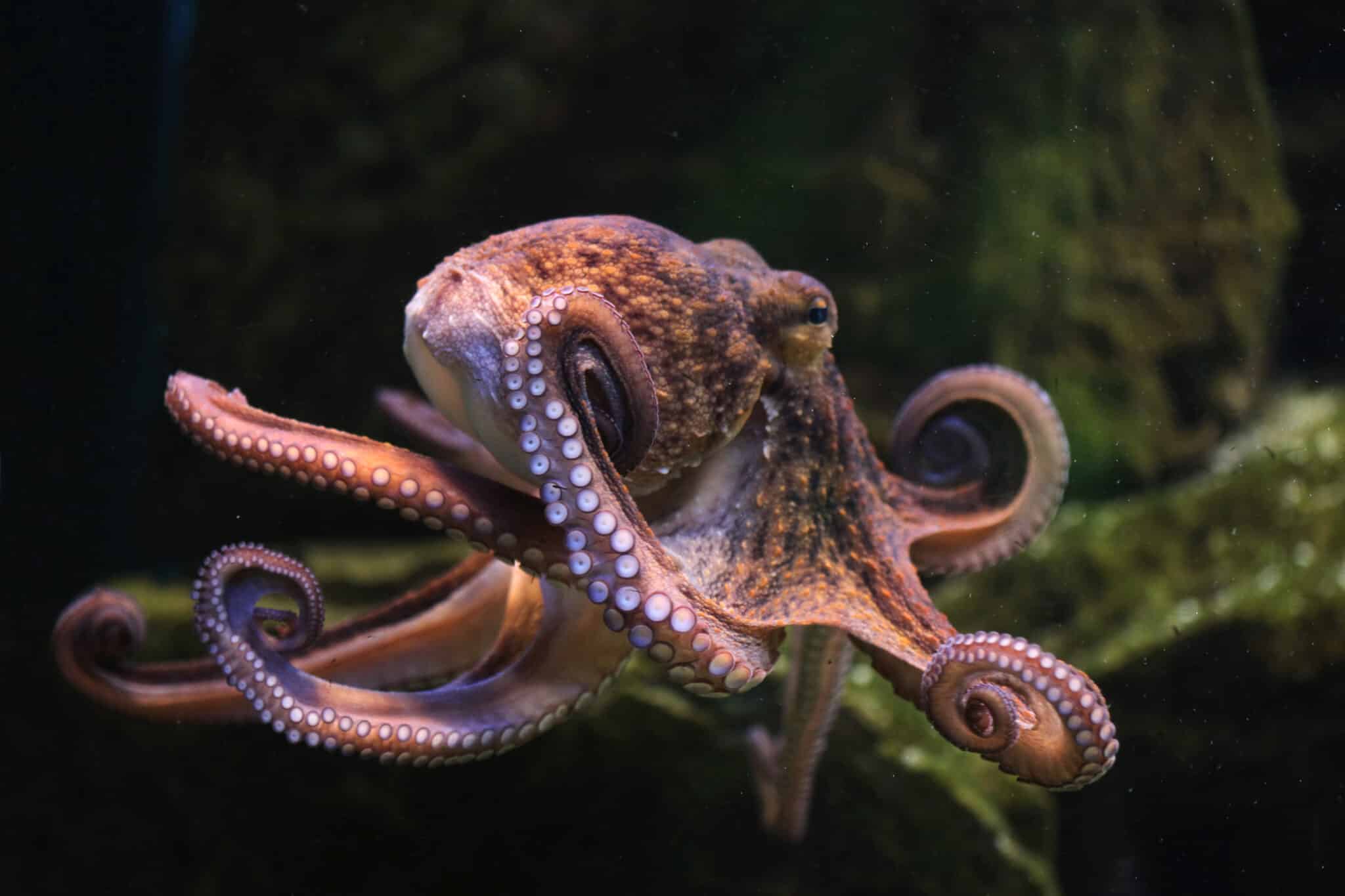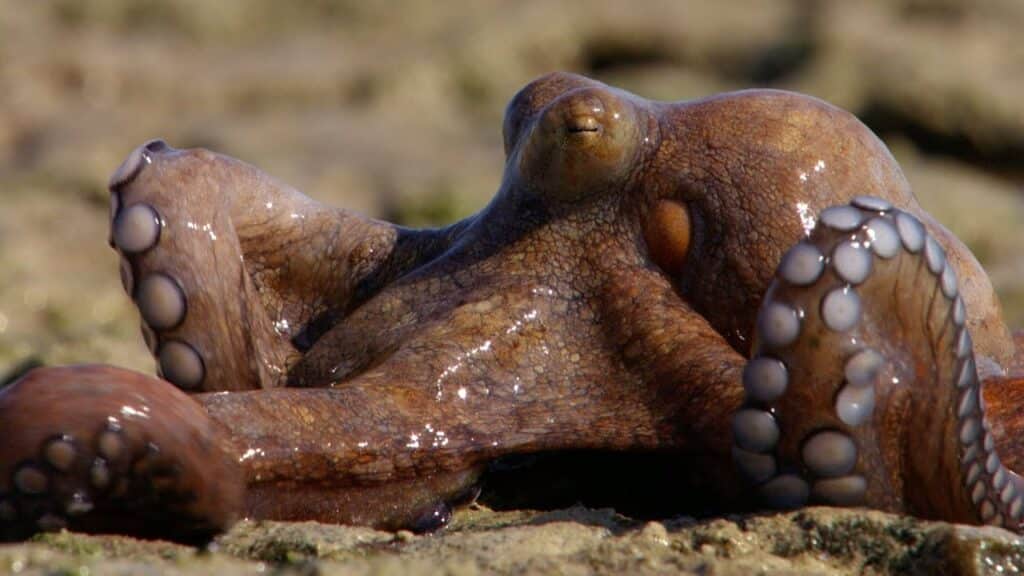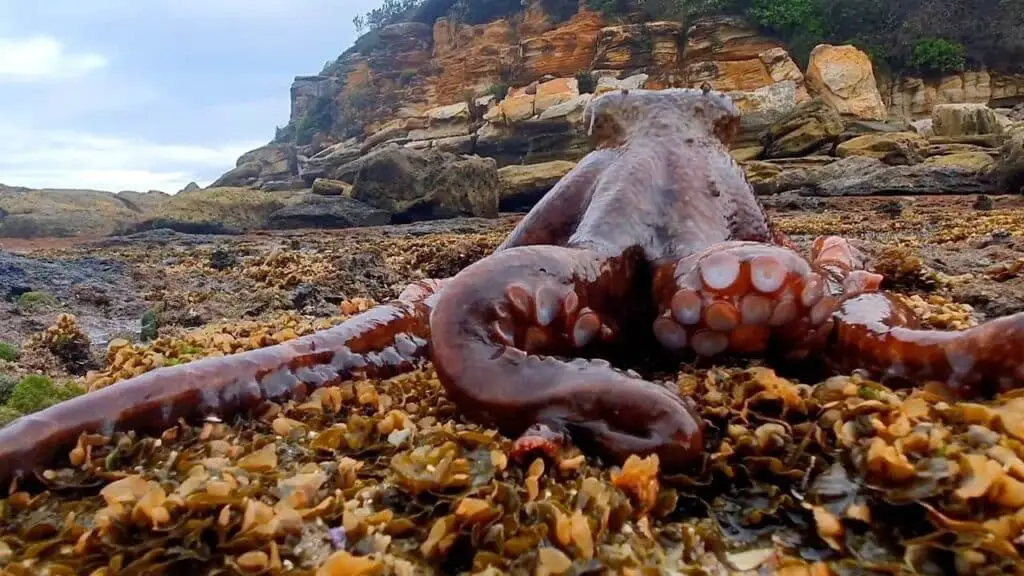Can Octopuses Breathe On Land

Introduction
Can Octopuses Breathe On Land: Octopuses, those enigmatic and highly intelligent denizens of the deep, have long fascinated scientists and ocean enthusiasts alike. These remarkable creatures, known for their mesmerising appearance and elusive behavior, are primarily inhabitants of the ocean’s depths. However, there exists a captivating aspect of their biology that transcends their underwater realm: their ability to briefly venture onto land.
The question of whether octopuses can breathe on land is one that has intrigued researchers for decades. Unlike terrestrial animals, octopuses lack lungs or gills suited for land-based respiration. Instead, their breathing apparatus relies on water and a unique method of extracting oxygen from it. To sustain life, octopuses typically draw water into their bodies, where oxygen diffuses across specialized gill structures, allowing them to extract the vital gas.
So, how can octopuses manage to survive on land, even for brief periods? It is a topic that delves into the realms of adaptation, physiology, and survival strategies honed through millions of years of evolution. Exploring this phenomenon not only sheds light on the incredible adaptability of these cephalopods but also poses intriguing questions about the boundaries of life and the potential for life to flourish in unexpected places.
We will delve into the mechanisms behind the octopus’s ability to breathe on land, the limitations they face in terrestrial environments, and the fascinating adaptations that enable them to temporarily step outside of their aquatic domain. Join us on this journey into the world of these aquatic marvels and their surprising forays onto land.

How long can an octopus survive on land?
But marine biologist Ken Halanych told Vanity Fair that octopuses can survive for around 20-30 minutes outside the water. It’s not unheard of for octopuses to come out of the sea — cephalopods experts say the nocturnal, eight-legged creatures have been known to roam the shores at night in search of food.
An octopus’s ability to survive on land is a testament to its remarkable adaptability. However, the duration for which an octopus can endure out of the water is relatively limited. Typically, an octopus can survive on land for anywhere from a few minutes to several hours, depending on various factors.
One crucial factor is the octopus’s species. Some species have adaptations that allow them to withstand longer periods out of water than others. For example, the common octopus (Octopus vulgaris) is known to tolerate shorter stints on land compared to the coconut octopus (Amphioctopus marginatus), which has been observed carrying protective shells and walking along the seabed.
Another vital consideration is environmental conditions. Octopuses are highly susceptible to desiccation, which means they can quickly dehydrate when exposed to dry air. Therefore, the humidity and temperature of the surroundings play a significant role in determining their survival time on land.
Octopuses’ excursions onto land are usually brief and purpose-driven, such as hunting for prey, escaping predators, or exploring new territory. Once they achieve their objective, they promptly return to the water to rehydrate and breathe through their gills.
Intriguingly, these terrestrial forays challenge our understanding of octopus behavior and physiology, highlighting the adaptability and resourcefulness of these incredible marine creatures. However, it’s crucial to remember that while octopuses can survive on land temporarily, they are fundamentally creatures of the sea, and their survival ultimately depends on their aquatic habitat.
How long can octopus breathe without water?
30-60 minutes
More videos on YouTube
It might seem abnormal, but most species of octopus can survive out of water for 30-60 minutes, allowing them to slink from pool to pool in search of food when the tide goes out. We rarely see these ‘air raids’ because cephalopods typically hunt at night!
Octopuses possess fascinating adaptations that allow them to extract oxygen from water efficiently. However, when it comes to breathing outside of water, their capabilities are severely limited. Octopuses cannot breathe in the air like terrestrial animals because they lack lungs. Instead, they rely on gills, specialized structures that extract oxygen from water.
When removed from water, octopuses can survive for only a very brief period. This time frame typically ranges from a few minutes to half an hour, depending on factors such as species, size, and environmental conditions. Larger octopuses may have slightly longer survival times, but they all face the same fundamental challenge: the risk of suffocation.
The reason for their limited ability to breathe out of water lies in their respiratory system’s design. Gills function optimally in a water-rich environment where oxygen is readily available for extraction. On land, the absence of water rapidly leads to oxygen deprivation and carbon dioxide buildup, which is fatal for octopuses.
In essence, an octopus’s ability to breathe without water is extremely limited, emphasizing their dependence on their aquatic habitat. This limitation underscores the uniqueness of these incredible creatures and highlights the importance of understanding their specialized adaptations for life beneath the waves.
How do octopus survive out of water?
Some octopuses leave the ocean to hunt in tidepools or on land, and they can do this thanks to their ability to absorb oxygen through their skin.
Octopuses are primarily aquatic creatures, and their survival out of water is a challenging endeavor. While they are not adapted for terrestrial life, they do possess some remarkable strategies that enable them to briefly endure on land when necessary.
- Stored Oxygen: Octopuses can survive out of water for short periods by relying on their ability to store oxygen in their blood. They have a special protein called hemocyanin, which carries oxygen and can provide a limited oxygen supply while on land.
- Moisture Retention: Octopuses have a soft and flexible body that helps them retain moisture. This adaptation prevents rapid desiccation (drying out) when exposed to air, which is critical for their survival.
- Quick Movements: When an octopus ventures onto land, it typically moves quickly to minimize the time spent out of water. This reduces the risk of oxygen deprivation and desiccation.
- Behavioral Adaptations: Octopuses often come ashore for specific purposes, such as hunting for prey or escaping predators. Once their mission is accomplished, they promptly return to the water, where they are more comfortable and can breathe through their gills.
It’s important to note that these terrestrial excursions are relatively brief and are driven by necessity rather than adaptation to a land-based lifestyle. Octopuses are fundamentally marine animals, and their ability to survive out of water is a testament to their resourcefulness in the face of challenging circumstances.
Do octopus ever sleep?
Octopus sleep is surprisingly similar to humans and contains a wake-like stage. Like humans, octopuses transition between two sleep stages – a quiet stage and an active stage that resembles REM sleep in mammals.
Octopuses, despite their complex and intriguing behaviors, do indeed sleep, although their sleep patterns are quite different from those of mammals or birds. Octopus sleep is a subject of ongoing scientific investigation, but researchers have made some interesting observations.
Octopuses are known to exhibit two distinct sleep states: quiet sleep and active sleep. During quiet sleep, an octopus appears still, with minimal movement and changes in coloration. This phase is somewhat akin to the deep sleep seen in mammals. In contrast, active sleep involves more movement, body color changes, and occasional twitching of the arms, resembling the rapid eye movement (REM) phase of sleep in humans.
The exact purpose of octopus sleep remains a topic of debate among scientists. It’s believed that sleep plays a role in memory consolidation, learning, and possibly even the processing of sensory information. While octopuses don’t have a centralized brain like mammals, they have a complex nervous system that allows them to exhibit these sleep patterns.
Interestingly, octopuses also exhibit what’s known as unihemispheric slow-wave sleep. This means that one hemisphere of their brain can enter a sleep state while the other remains active and alert, allowing them to remain vigilant for potential threats even while resting.
Octopuses do experience sleep, but their sleep patterns are unique and different from those of many other animals. The study of octopus sleep provides valuable insights into the diverse ways that different species rest and regenerate their bodies and minds.
Can octopus breathe air without oxygen?
Octopuses need oxygen to survive, just like humans, fish, and almost every other organism on Earth. But you may be wondering, how do octopuses breathe oxygen? Short answer: They have gills that extract dissolved oxygen from seawater.
Octopuses, like all living organisms, rely on oxygen for survival. They cannot breathe air without access to oxygen, as they lack the specialized respiratory adaptations that terrestrial animals possess. Octopuses are obligate aquatic animals, meaning they are entirely dependent on water for respiration.
Octopuses extract oxygen from water through their gills. These gills contain thin, delicate filaments that allow for the exchange of oxygen and carbon dioxide as water flows over them. This process is essential for their survival, providing the necessary oxygen to fuel their metabolic processes.
When an octopus is removed from water or finds itself in an oxygen-deprived environment, it cannot extract the needed oxygen from the air. In such situations, their ability to survive is severely compromised, and they may suffocate or experience extreme stress.
While octopuses are highly adaptable and capable of brief terrestrial excursions, these episodes are short-lived and driven by specific needs, such as hunting or escaping predators. They always return to the water to replenish their oxygen supply. In essence, octopuses cannot breathe air without oxygen, and their reliance on aquatic environments underscores their remarkable adaptations for life beneath the waves.
Can octopuses move on land?
Octopuses are primarily aquatic animals, but they do have some intriguing abilities that enable them to move on land, albeit briefly and clumsily. Their mobility on land is a testament to their adaptability and resourcefulness.
When octopuses venture onto land, they use their muscular arms to crawl and drag their bodies. They rely on the flexibility and strength of their arms to propel themselves, making slow, deliberate movements. This terrestrial locomotion is quite different from their graceful, fluid movements in the water, but it serves their immediate purposes.
One of the most notable instances of octopus movement on land is often observed during their hunting expeditions. Some octopus species, like the coconut octopus, have been observed carrying objects such as coconut shells to use as protective shelters. This behavior includes using their arms to carry and move these objects across the ocean floor, showcasing their ability to adapt their movements to different environments.
However, it’s important to note that octopuses cannot survive on land for extended periods. Their physiology is adapted for life in the water, and their breathing and metabolic processes are optimized for underwater environments. Thus, their terrestrial excursions are typically brief and goal-oriented, emphasizing their remarkable capacity to adapt to diverse environments when necessary.
What happens to an octopus if it is out of water for too long?
When an octopus is out of water for an extended period, it faces several significant challenges and potential consequences due to its aquatic nature. Here’s what happens if an octopus remains out of water for too long:
- Oxygen Deprivation: Octopuses rely on water to extract oxygen through their gills. When out of water, they cannot breathe, and their oxygen supply quickly depletes. Oxygen deprivation can lead to severe stress, injury, or even death.
- Desiccation: Octopuses are highly susceptible to desiccation, which means they can rapidly dry out when exposed to the air. Their soft bodies lose moisture, and this can result in tissue damage, affecting their overall health.
- Overheating: Octopuses are adapted to the relatively stable temperature of the ocean. Exposure to high temperatures on land can cause overheating, leading to physiological stress and potentially fatal consequences.
- Predator Vulnerability: On land, octopuses are vulnerable to terrestrial predators, such as birds and mammals, which can pose a significant threat.
- Limited Movement: Octopuses’ movements on land are limited and often clumsy. They struggle to navigate terrestrial terrain effectively, which can lead to injury or exhaustion.
When an octopus remains out of water for too long, it faces a series of life-threatening challenges, including oxygen deprivation, desiccation, overheating, vulnerability to predators, and restricted mobility. While they can make brief excursions onto land for specific purposes, such as hunting or escaping danger, their survival depends on returning to the water where they can breathe and thrive.
Are there any species of octopuses that can survive on land?
There are no species of octopuses that are capable of surviving on land for extended periods. Octopuses are fundamentally marine creatures with specialized adaptations for life in aquatic environments. While some octopus species can tolerate brief excursions onto land, these instances are typically short-lived and driven by specific needs, such as hunting, escaping predators, or exploring new territories.
One of the most well-known examples of terrestrial movement among octopuses is the coconut octopus (Amphioctopus marginatus). This species has been observed carrying objects like coconut shells as portable shelters, and it can awkwardly move across the ocean floor or crawl on land for short distances. However, even the coconut octopus cannot thrive on land for an extended period.
The physiological limitations of octopuses make it impossible for them to survive without access to water. Their respiration, circulation, and temperature regulation are all intricately tied to their aquatic habitat, and prolonged exposure to terrestrial conditions would lead to oxygen deprivation, desiccation, overheating, and ultimately, death.
While octopuses demonstrate remarkable adaptability and resourcefulness in their underwater world, they remain indisputably dependent on water for their survival and cannot transition to a truly terrestrial lifestyle.

Conclusion
While they are unequivocally creatures of the sea, they possess unique mechanisms that allow them to make brief excursions onto land, challenging our understanding of where life can thrive. Octopuses achieve this astonishing feat through a combination of clever strategies.
They rely on their exceptional ability to store oxygen in their bloodstream, ensuring they have a temporary oxygen supply while on land. Additionally, their highly flexible bodies enable them to move in ways that minimize the time spent out of water, reducing the risk of oxygen deprivation.
However, these terrestrial sojourns come with inherent limitations. Octopuses remain vulnerable to desiccation and must return to the ocean relatively quickly. Their forays onto land are typically motivated by the pursuit of prey or evasion of predators rather than a true adaptation to terrestrial marine life.
The ability of octopuses to breathe on land serves as a reminder of the incredible diversity of life on Earth and the adaptability of organisms to their environments. It encourages us to continue exploring the boundaries of biology and to better understand the astonishing capabilities of the creatures that inhabit our planet’s many ecosystems.



